Water Intoxication: What happens when your dog drinks too much water
By admin / July 18, 2022 / No Comments / Pet Dogs
All of us have heard the importance of keeping ourselves and our pets well hydrated, but did you know that they can drink too much water? That’s right, there’s a condition called water intoxication, and it can be quite dangerous.
So, what exactly is water intoxication in dogs and how does it even happen? In this article, we will explain this curious condition and how you can prevent it in your water-loving canine.
What Is Water Intoxication In Dogs?
Water intoxication goes by several names such as hyponatremia (lack of sodium in the body), water poisoning or hyperhydration.
The way that a dog develops water intoxication is by ingesting a large quantity of water that then leads to the body losing essential sodium, creating an imbalance. This sodium loss causes cells to swell with fluid. When this happens, parts of the body that are encased in bone, such as the brain, will also swell and cause pressure in the cranium. This added pressure can cause potentially fatal issues with the central nervous system.
The onset of this condition is quick and due to the severity and potential for death, it is important that any suspicion should be followed up with your veterinarian right away.
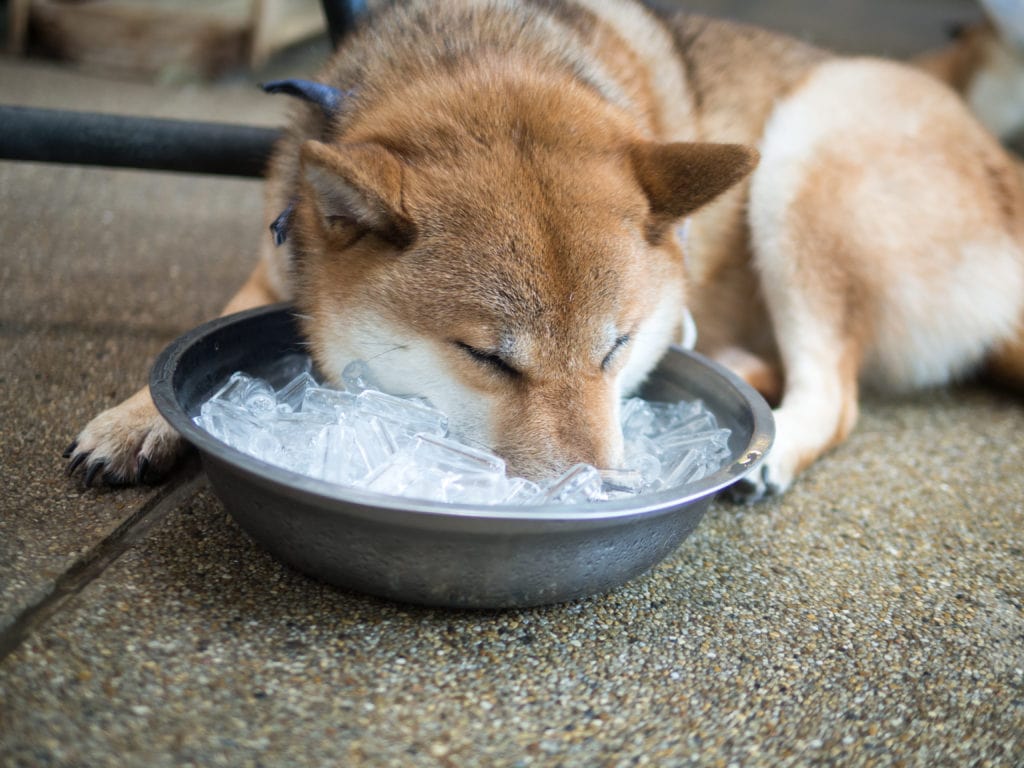
How Do Dogs Develop Water Intoxication?
In most cases, especially in us humans, water intoxication comes from drinking too much fluid after vigorous exercise or some type of water drinking competition.
Comparitively, in dogs, the occurrence happens primarily with canines who are:
- Active swimmers,
- Divers
- Water-retrievers
- Allowed playtime with the hose or sprinkler
- Allowed to eat ice
Did You Know?
A small or toy breed of dog will be quicker to develop water intoxication than a medium-sized or larger breed of dog simply because of the size and weight difference.
The reason that water intoxication is seen more in our canine companions is that they do not sweat, therefore their bodies have to work harder to eliminate excess fluid.
What Are The Symptoms Of Water Intoxication In Dogs?
If your pet has been playing in the water and you begin to notice any of the following symptoms then contact your veterinarian right away.
- Bloating
- Lethargy
- Pale gums
- Vomiting
- Dilated pupils
- Glazed eyes
- Difficulty walking/staggering
- In and out of consciousness
In more severe cases where the excessive fluid has caused swelling of the brain, neurological symptoms such as the following can be seen as well.
- Difficulty breathing
- Seizures
- Coma
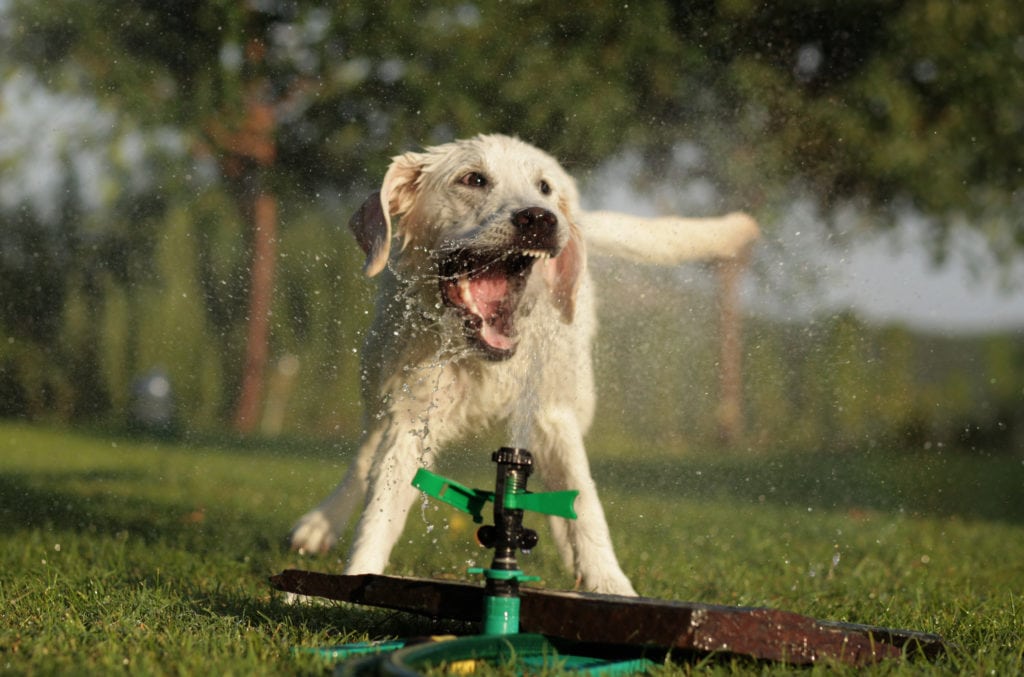
Which Dogs Are At A Greater Risk Of Water Intoxication?
The good news is that there aren’t any particular breeds that are more susceptible to water intoxication than others.
However, dogs that are not experienced swimmers or are being conditioned for water-retrieving or rescue exercises can be put in situations where they will be at risk for ingesting an excessive amount of water.
Some dogs, such as the terrier breeds, can have a high energy drive and impressive pain tolerance which can lead to them pushing through symptoms of discomfort, giving you less reaction time when the more severe issues, such as difficulty walking and breathing, finally are noticed.
Then, it’s good to know that dogs who have a lower concentration of body fat are also quicker to develop water intoxication because there is less tissue to absorb the excessive fluid intake.
Other dogs that are bred for activities in the water, like Labradors, Newfoundlands and the Chesapeake Bay Retrievers, are less likely to develop water intoxication.
While we are not 100% certain of the reason behind this, we can only assume it is due to their inherent swimming abilities and genetic conditioning over the years of training and breeding.
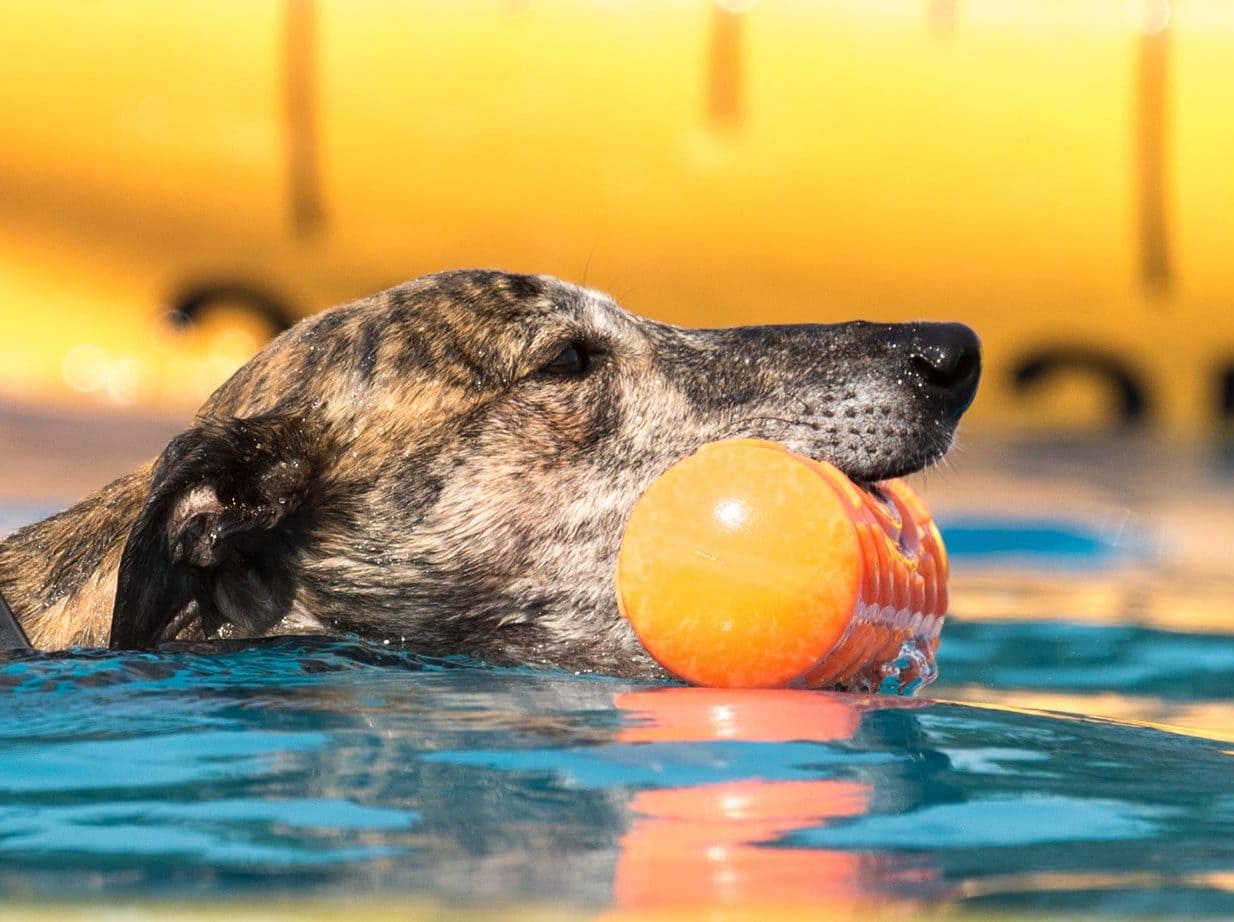
How Do You Treat Water Intoxication In Dogs?
Treating water intoxication can be successful if the pet is brought in while still having the mild to moderate symptoms. The first thing to do is to correct the sodium imbalance within the body, and the best way to accomplish this is through the administration of intravenous electrolytes. This must be done with care, as overcorrection the sodium loss can lead to other neurological complications.
Sometimes veterinarians will choose to administer drugs, such as Mannitol, to help relieve the pressure on the brain or even diuretics, such as Lasix, to encourage the removal of internal excess fluid.
Because the subject of water intoxication is not commonly discussed or learned about in many veterinary programs, this condition can be easily misdiagnosed as trauma, overexertion or even hypothermia.
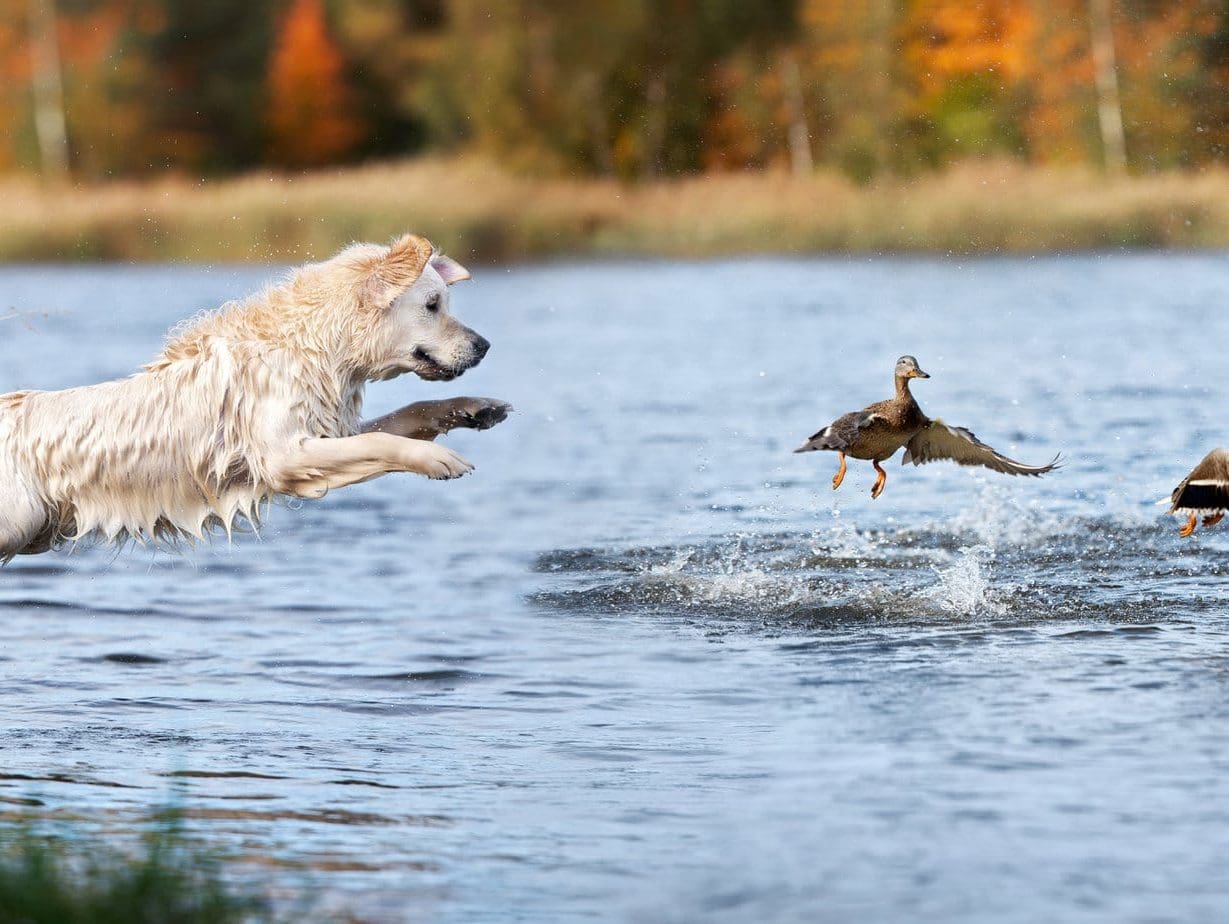
How Can You Prevent Water Intoxication In Your Dog?
As always, prevention and education is key!
Now that you know the symptoms and the ways with which water intoxication can happen, you are already ahead of the pack. Whether your dog has a pool or a sprinkler, here are several of the preventative methods and things to watch out for when your beloved companion is having some summer fun in the water.
1 – What’s your dog’s swimming style?
Does your dog splash a lot or keep their mouth open slightly when swimming? Do they like to gobble the water when it comes out of the hose or sprinkler?
If so, then your dog is one of those that are at a greater risk of water intoxication and they should be removed from their splashing and play time for frequent rest breaks.
2 – Limit their time in the water.
This touches on the last thing that was mentioned from #1. Frequent rest breaks are extremely important, especially if your dog is swimming or diving into the water to retrieve toys.
To help combat the issue of them swallowing too much water while dock diving or fetching a toy, you can find them a flat toy for their water excursions as they are less likely to cause your dog to swallow excessive amounts of water.
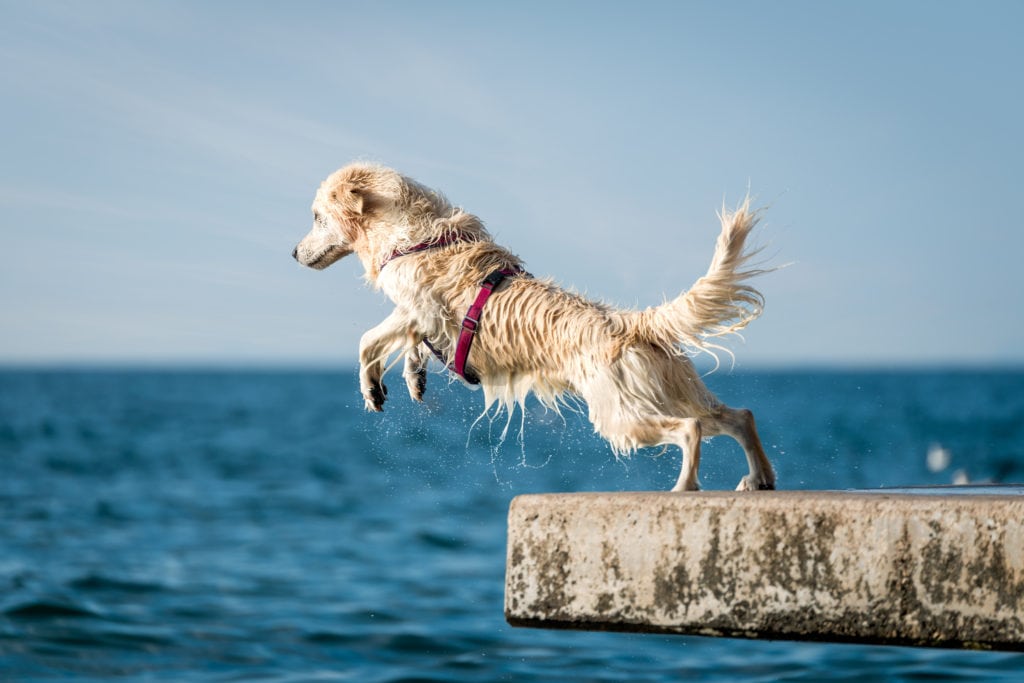
3 – Always supervise your dog while playing with or in the water.
Think about your dog like a small child – you wouldn’t leave them unsupervised with water as dangerous and life-threatening things can happen. Even if they aren’t at risk of drowning in a pool or other body of water, dogs with sprinklers and garden hoses may not know when to stop drinking.
4 – If you know that your dog has a drinking problem.
Well, you know I’m not talking about that kind of drinking problem. But some doggos just really like water and will go to town on drinking it if they are left to their own devices. Dogs like this should, in general, not be left with unlimited access to water, no matter the situation.
A good thing here is the Whistle Switch – because it actually shows you your dogs drinking rate. Which is really interesting and it’s something that could alert you to underlying medical issues, and/or if they’re just drinking too much if you’re concerned!
Honestly, the medical monitoring that the whistle switch provides is so interesting!!
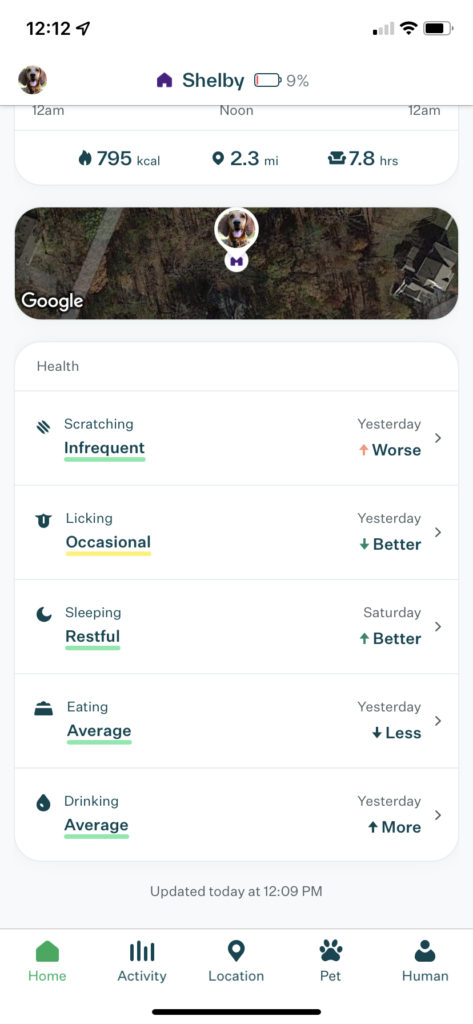
5 – Have water available.
Yeah, I know, that seems silly, right? Well, trust me, it will help. Once a dog becomes extremely thirsty, they are more likely to gorge and ingest an excessive amount at one time, either resulting in water intoxication or (best case scenario) they puke right away.
If a dog has a small, drinkable water supply in a dog bowl, they are more likely to drink that as they become a little thirsty here and there, instead of over-ingesting much later.
6 – Know your dog’s health.
Sometimes dogs can feel very thirsty due to certain medical conditions. For instance, endocrine disorders like Cushing’s disease, and conditions like diabetes and kidney failure can cause polydipsia. Which is essentially just a fancy doctor term for increased drinking.
If you suspect that your dog is seeking out water to drink for a potential reason other than being thirsty, then it would be wise to call your veterinarian for an appointment and some blood work.
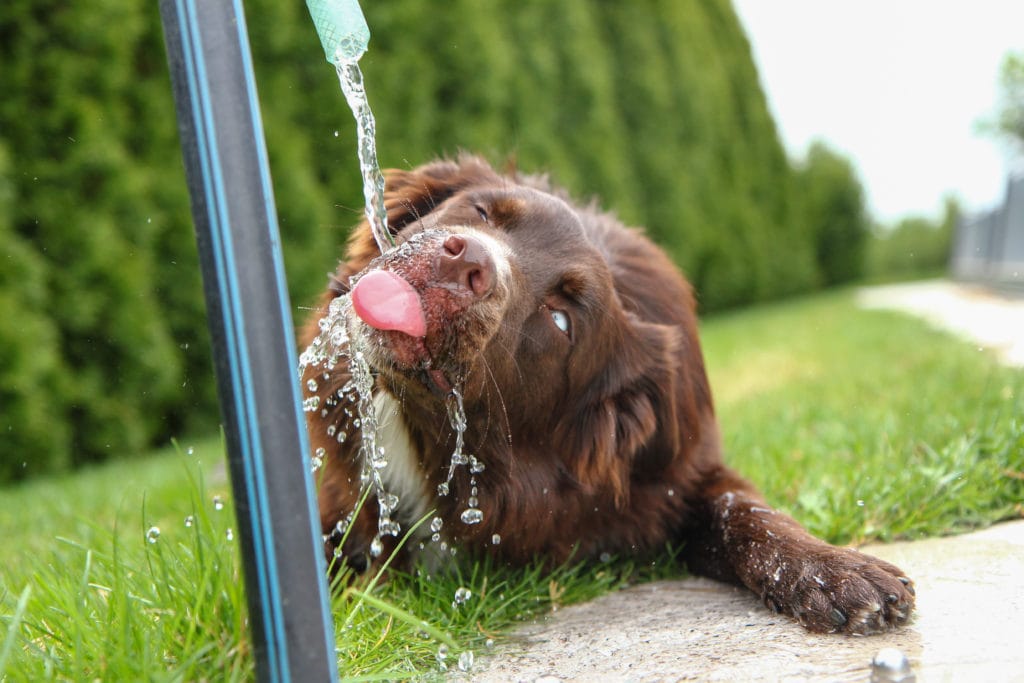
7 – Limit your dog’s Ice intake
Ice is water, and yes! It has cooling properties, but as it thaws it can be just as problematic. Try not to treat ice cubes as treats, and generally you’ll be pretty okay. As always, this is over ingestion. one or two here or there will be fine.
What About Fresh Water Vs Salt Water?
This is particularly important for owners that frequent salt water beaches with their dog. When dogs are swimming in the ocean, they are at risk of ingesting the super salty water, which in excessive amounts can lead to sodium poisoning, or hypernatremia (too much sodium in the body).
The symptoms of salt poisoning or hypernatremia in dogs are:
- Vomiting
- Lethargy
- Dehydration
- Seizures or convulsions
- Fits and muscle tremors
- Confusion/disorientation
- Uncontrolled bowel movements or diarrhea
- Excessive thirst
- Excessive urination
Like hyponatremia, aka water intoxication, the ingestion of too much salt water can cause an equally dangerous and detrimental effect on your dog’s body and central nervous system, even resulting in death.
If you suspect that your dog has ingested too much salt water, then contact your veterinarian right away about getting them seen. Any of the above symptoms warrant an immediate veterinary visit!
As always: Call Your Vet!
If you don’t know what’s going on? And you’re not sure what the issue is? Call your vet!
Find other solutions to keep your dog cool
Water intoxication is something that many owners had no idea could even happen. This condition can be a truly sneaky and life-threatening emergency, so staying well-informed and educated is the first part of preventing this from happening to you and your beloved canine companion.
If you are concerned that your dog has ingested too much water while having a fun play session outside in the yard, at the pool or even on the beach, then please contact your veterinarian right away as water intoxication is potentially fatal if left untreated.
Author, Ali Smith
Ali Smith is the Positive Puppy Expert, dog trainer and is the founder of Rebarkable. She is passionate about helping puppy parents get things right, right from the start. To help create a puppy capable of being a confident and adaptable family member and keep puppies out of shelters.
Ali has won multiple awards for her dog training, and has had her blog (this blog!) rated as 2021 & 2022 worlds’ best pet blog!
Link to originalRebarkable
